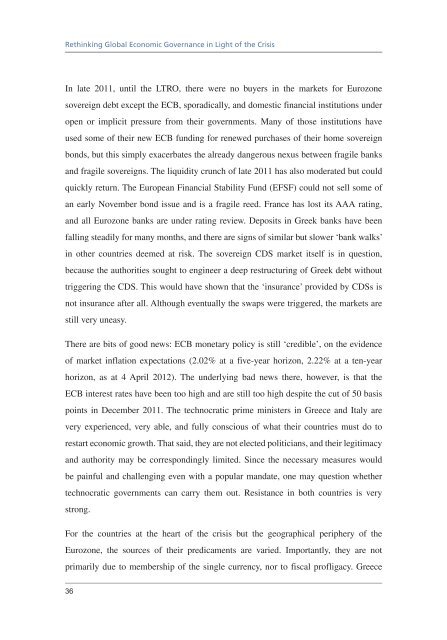Download PDF - Vox
Download PDF - Vox
Download PDF - Vox
- No tags were found...
Create successful ePaper yourself
Turn your PDF publications into a flip-book with our unique Google optimized e-Paper software.
Rethinking Global Economic Governance in Light of the CrisisIn late 2011, until the LTRO, there were no buyers in the markets for Eurozonesovereign debt except the ECB, sporadically, and domestic financial institutions underopen or implicit pressure from their governments. Many of those institutions haveused some of their new ECB funding for renewed purchases of their home sovereignbonds, but this simply exacerbates the already dangerous nexus between fragile banksand fragile sovereigns. The liquidity crunch of late 2011 has also moderated but couldquickly return. The European Financial Stability Fund (EFSF) could not sell some ofan early November bond issue and is a fragile reed. France has lost its AAA rating,and all Eurozone banks are under rating review. Deposits in Greek banks have beenfalling steadily for many months, and there are signs of similar but slower ‘bank walks’in other countries deemed at risk. The sovereign CDS market itself is in question,because the authorities sought to engineer a deep restructuring of Greek debt withouttriggering the CDS. This would have shown that the ‘insurance’ provided by CDSs isnot insurance after all. Although eventually the swaps were triggered, the markets arestill very uneasy.There are bits of good news: ECB monetary policy is still ‘credible’, on the evidenceof market inflation expectations (2.02% at a five-year horizon, 2.22% at a ten-yearhorizon, as at 4 April 2012). The underlying bad news there, however, is that theECB interest rates have been too high and are still too high despite the cut of 50 basispoints in December 2011. The technocratic prime ministers in Greece and Italy arevery experienced, very able, and fully conscious of what their countries must do torestart economic growth. That said, they are not elected politicians, and their legitimacyand authority may be correspondingly limited. Since the necessary measures wouldbe painful and challenging even with a popular mandate, one may question whethertechnocratic governments can carry them out. Resistance in both countries is verystrong.For the countries at the heart of the crisis but the geographical periphery of theEurozone, the sources of their predicaments are varied. Importantly, they are notprimarily due to membership of the single currency, nor to fiscal profligacy. Greece36














